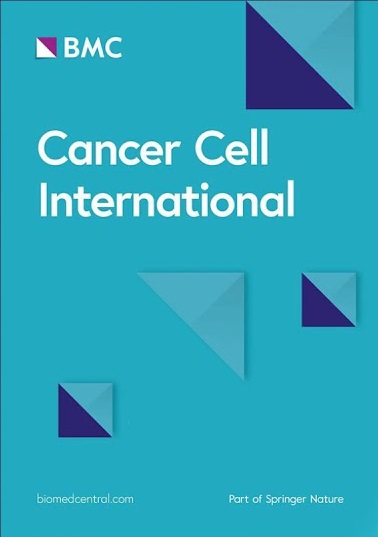Enhanced anti-tumor efficacy of S3I-201 in breast cancer mouse model through Wharton jelly- exosome
IF 5.3
2区 医学
Q1 ONCOLOGY
引用次数: 0
Abstract
Exosomes, membrane-enveloped vesicles found in various cell types, including Wharton’s jelly mesenchymal stem cells, play a crucial role in intercellular communication and regulation. Their use as a cell-free nanotechnology and drug delivery system has attracted attention. Triple-negative breast cancer (TNBC) is a major global health problem and is characterized by a high mortality rate. This study investigates the potential of Wharton’s Jelly mesenchymal stem cell-derived exosomes (WJ-Exo) as carriers of S3I-201 and their effects on STAT3 expression in breast cancer cell lines, and evaluates whether these exosomes can enhance the anti-tumor effect of S3I-201. The filtered WJ-Exos were analyzed by Transmission Electron Microscopy (TEM), Scanning electron microscopy (SEM), Dynamic Light Scattering (DLS), flow cytometry, and Western blotting. These exosomes were then used for loading with S3I-201, resulting in the nano-formulation WJ-Exo(S3I-201). The effect of WJ-Exo(S3I-201) on 4T1 cancer cells was investigated in vitro using MTT assay, flow cytometry, wound healing assay, Western blotting and Quantitative Real-Time Polymerase chain reaction (qPCR) analysis. Finally, the therapeutic efficacy of the nano-formulation was investigated in vivo using a tumor-bearing mouse model. In vitro experiments showed that co-incubation of 4T1 cells with the nano-formulation resulted in a significant reduction in p-STAT3 levels, induction of apoptosis, modulation of Bcl-2, Bax and caspase-3 protein and gene expression, and inhibition of migration. In vivo, treatment of tumor-bearing mice with WJ-Exo(S3I-201) showed a strong antitumor effect that exceeded the efficacy observed in the S3I-201 group. Our results demonstrate that WJ-Exo is an effective carrier for targeting S3I-201 to tumor cells and enhances the therapeutic efficacy of S3I-201 in tumor-bearing mice.通过沃顿果冻外泌体提高 S3I-201 在乳腺癌小鼠模型中的抗肿瘤疗效
外泌体是在包括沃顿果冻间充质干细胞在内的各种细胞中发现的膜包囊泡,在细胞间通信和调节中发挥着至关重要的作用。它们作为一种无细胞纳米技术和药物输送系统备受关注。三阴性乳腺癌(TNBC)是一个重大的全球健康问题,其特点是死亡率高。本研究探讨了沃顿果冻间充质干细胞衍生的外泌体(WJ-Exo)作为S3I-201载体的潜力及其对乳腺癌细胞系中STAT3表达的影响,并评估了这些外泌体是否能增强S3I-201的抗肿瘤效果。研究人员利用透射电子显微镜(TEM)、扫描电子显微镜(SEM)、动态光散射(DLS)、流式细胞术和 Western 印迹技术分析了过滤后的 WJ 外泌体。这些外泌体随后被用于装载 S3I-201,形成纳米制剂 WJ-Exo(S3I-201)。通过 MTT 试验、流式细胞仪、伤口愈合试验、Western 印迹和定量实时聚合酶链反应(qPCR)分析,体外研究了 WJ-Exo(S3I-201) 对 4T1 癌细胞的影响。最后,利用肿瘤小鼠模型对纳米制剂的治疗效果进行了体内研究。体外实验表明,纳米制剂与 4T1 细胞共培养可显著降低 p-STAT3 水平,诱导细胞凋亡,调节 Bcl-2、Bax 和 caspase-3 蛋白和基因的表达,并抑制细胞迁移。在体内,用 WJ-Exo(S3I-201)治疗肿瘤小鼠显示出很强的抗肿瘤效果,超过了 S3I-201 组的疗效。我们的研究结果表明,WJ-Exo 是将 S3I-201 靶向肿瘤细胞的有效载体,能增强 S3I-201 对肿瘤小鼠的疗效。
本文章由计算机程序翻译,如有差异,请以英文原文为准。
求助全文
约1分钟内获得全文
求助全文
来源期刊

Cancer Cell International
ONCOLOGY-
CiteScore
10.90
自引率
1.70%
发文量
360
审稿时长
1 months
期刊介绍:
Cancer Cell International publishes articles on all aspects of cancer cell biology, originating largely from, but not limited to, work using cell culture techniques.
The journal focuses on novel cancer studies reporting data from biological experiments performed on cells grown in vitro, in two- or three-dimensional systems, and/or in vivo (animal experiments). These types of experiments have provided crucial data in many fields, from cell proliferation and transformation, to epithelial-mesenchymal interaction, to apoptosis, and host immune response to tumors.
Cancer Cell International also considers articles that focus on novel technologies or novel pathways in molecular analysis and on epidemiological studies that may affect patient care, as well as articles reporting translational cancer research studies where in vitro discoveries are bridged to the clinic. As such, the journal is interested in laboratory and animal studies reporting on novel biomarkers of tumor progression and response to therapy and on their applicability to human cancers.
 求助内容:
求助内容: 应助结果提醒方式:
应助结果提醒方式:


